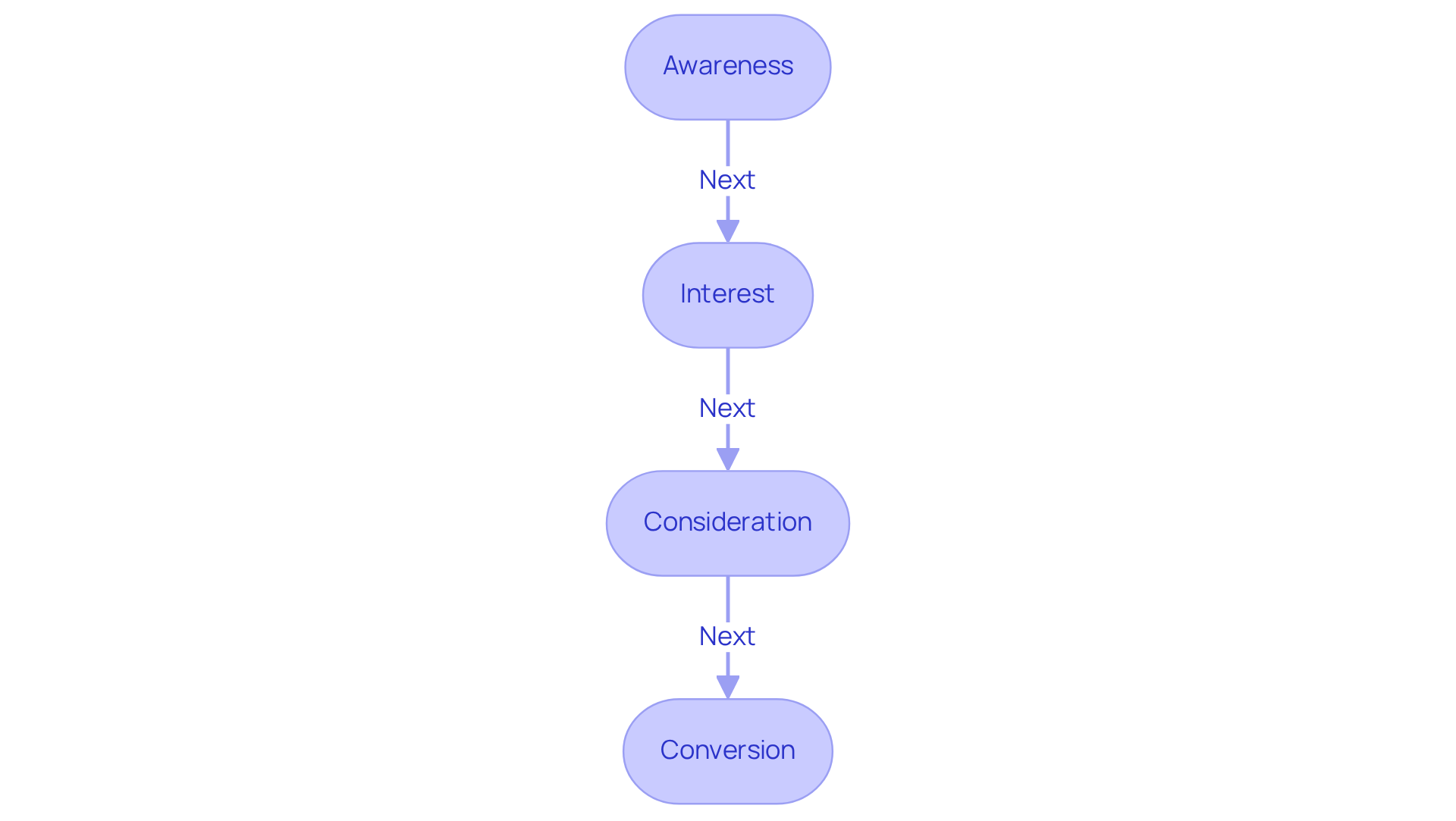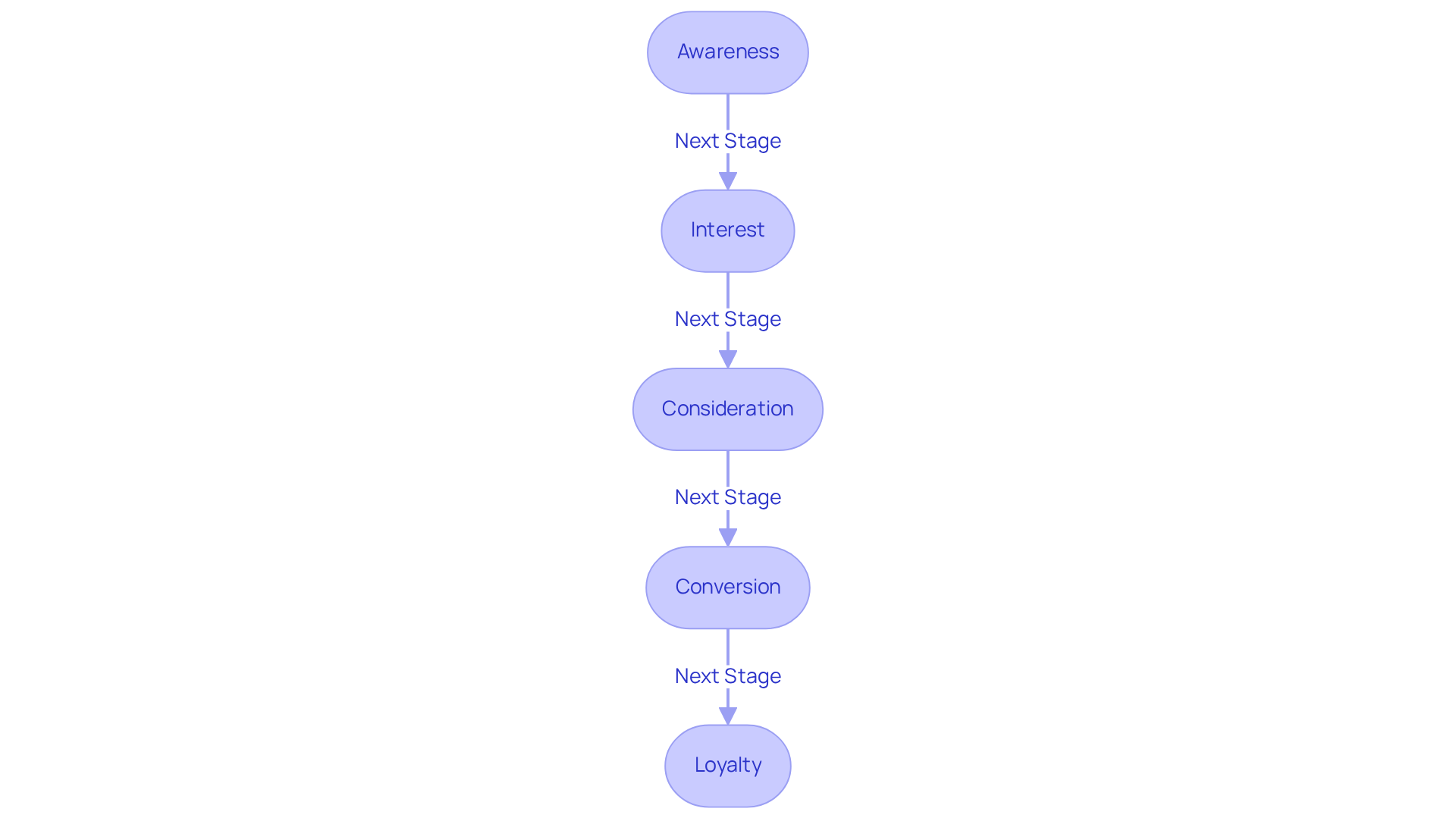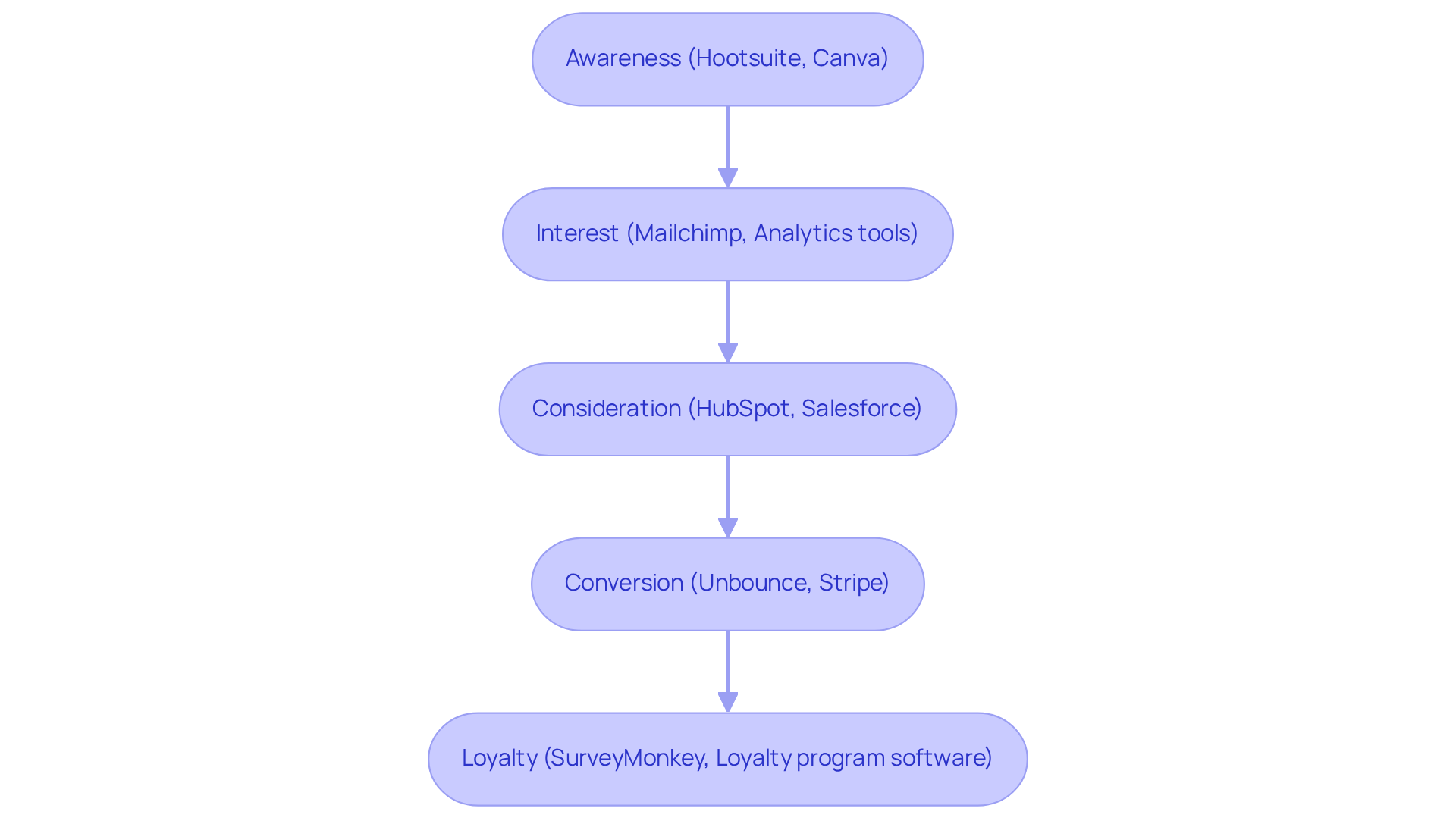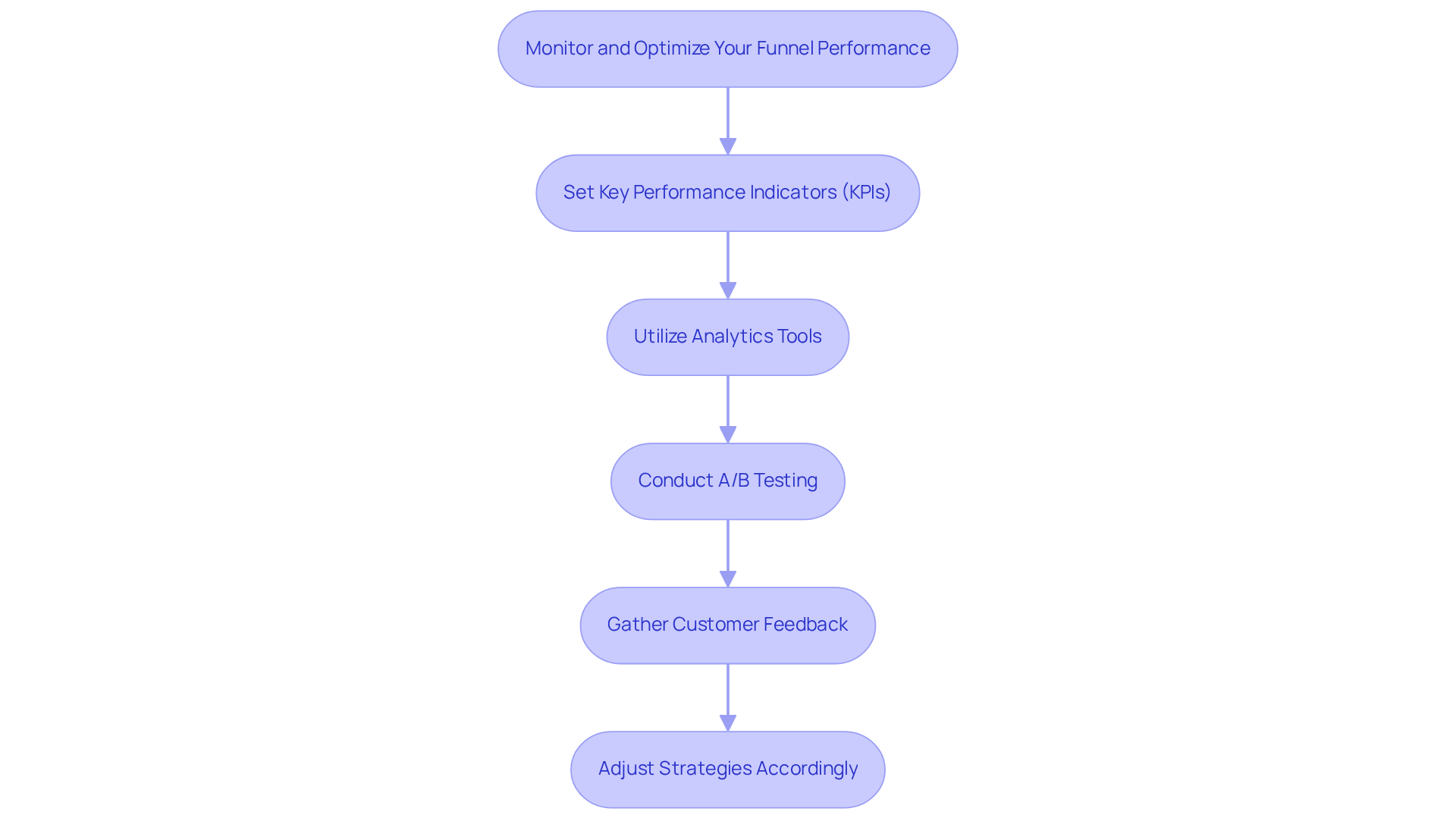Overview
The article highlights the importance of mastering an automated marketing funnel for the success of small businesses. It outlines the key stages—Awareness, Interest, Consideration, Conversion, and Loyalty—while offering strategies to navigate each stage effectively.
We understand the challenges you face, and this article provides data-driven insights and automation tools designed to enhance customer engagement and boost conversion rates.
Ultimately, these strategies foster sustainable growth and nurture long-term client relationships, empowering you to thrive in your business journey.
Introduction
Understanding the intricacies of an automated marketing funnel can truly be the key to unlocking your small business success. As you navigate the journey from awareness to conversion, it’s essential to tailor your strategies to effectively guide this process.
But with so many potential pitfalls along the way, how can you ensure that valuable leads aren’t slipping through the cracks? In this article, we will explore the essential stages of the marketing funnel, offering actionable insights and automation tools designed to enhance customer engagement and drive sustainable growth. Together, we can address these challenges and foster a path to success.
Define the Marketing Funnel and Its Importance
A promotional process visually illustrates the journey a prospective client undergoes prior to making a purchase, encompassing four key stages:
- Awareness
- Interest
- Consideration
- Conversion
For small business owners, understanding this process is essential. It allows you to customize your promotional strategies to effectively guide prospects through each stage. By clearly outlining the automated marketing funnel, you can identify where you might be losing potential clients and adjust your strategies accordingly. This organized approach enhances customer interaction—did you know that 77% of consumers prefer brands that offer personalized experiences?—and significantly boosts success rates.
Imagine businesses that refine their sales processes reaching success rates of 5.31% or more, with top achievers surpassing 10%. With , small business owners receive daily email updates that provide key metrics on leads reached, interest shown, and improving conversion rates. These insights empower you to make informed adjustments to your promotional strategies, ensuring you effectively nurture prospects through the entire automated marketing funnel process. Ultimately, mastering the promotional pipeline is crucial for driving sustainable growth and achieving long-term success. Together, we can navigate this journey and unlock your business's potential.

Identify the Stages of Your Automated Marketing Funnel
To effectively manage your automated marketing funnel, it’s essential to identify and understand its stages with care:
- Awareness: At the top of the funnel, potential customers first learn about your business. By utilizing social media, content promotion, and SEO strategies, you can attract attention. Did you know that nearly 80% of B2B businesses generate leads through content marketing? This makes it a vital tool for creating awareness and reaching out to those who need your services.
- Interest: Once prospects are aware of your brand, the next step is to pique their interest. Engaging content, informative emails, and targeted ads that highlight your unique value propositions can be incredibly effective. Personalized email campaigns can increase click-through rates by 41%, showcasing their power in this stage. With , you can receive daily email updates that provide key metrics, including the number of leads reached and who showed interest, allowing you to refine your strategies effectively.
- Consideration: At this stage, prospects evaluate your offerings against competitors. Providing detailed product information, case studies, and testimonials can help them make informed decisions. Remember, nurtured leads create 20% more sales opportunities than those that aren’t nurtured. This underscores the importance of effective communication during this phase, ensuring your prospects feel supported in their decision-making process.
- Conversion: This is the critical moment when prospects become customers. Implement clear calls-to-action, limited-time promotions, and simple checkout procedures to enhance customer engagement. The typical rate of change for sales funnels across all sectors is about 2.35%. This highlights the necessity for enhanced strategies to boost this metric. Wayy.ai monitors success rates and demonstrates how they are advancing, providing you with insights to improve your sales performance and support your growth.
- Loyalty: After conversion, focus on keeping clients through follow-up communications, loyalty programs, and personalized offers. This stage is essential for building long-term relationships and encouraging repeat business. Companies that excel at lead nurturing experience a 23% shorter sales cycle, emphasizing the long-term benefits of effective lead nurturing. Additionally, repeat clients are 9 times more likely to finalize a purchase than new visitors, further highlighting the importance of loyalty.
By clearly defining these stages and utilizing tools like Wayy.ai for daily insights, small business owners can create tailored outreach plans that fit within an automated marketing funnel and resonate with their target audience. Together, we can achieve increased sales and foster lasting customer loyalty.

Leverage Automation Tools for Each Stage
We understand the importance of leveraging the right tools at each stage to maximize the efficiency of your automated marketing funnel. Here’s how you can enhance your approach:
- Awareness: Consider utilizing social media management tools like Hootsuite or Buffer. These can help you schedule posts and engage with your audience effectively. Additionally, content creation platforms such as Canva allow you to design eye-catching graphics that capture attention, enhancing your brand visibility. A report indicates that 80% of promoters credit their success to the implementation of an automated marketing funnel, underscoring the significance of efficient outreach.
- Interest: Think about implementing email promotion platforms like Mailchimp or Constant Contact. These tools enable you to send targeted campaigns that nurture leads. Tracking engagement with is essential, as it allows you to adjust your messaging based on real-time data and improve response rates. Almost two-thirds of promoters (61%) believe that lead generation is the most crucial objective of the automated marketing funnel, highlighting the importance of this phase.
- Consideration: Use CRM systems such as HubSpot or Salesforce to manage customer interactions and deliver personalized experiences. These tools enable you to segment your audience based on behavior and preferences, fostering deeper connections with potential clients. Businesses utilizing an automated marketing funnel often experience a 14.2% increase in sales productivity, showcasing the effectiveness of these tools.
- Conversion: Employ landing page builders like Unbounce or Leadpages to create optimized pages that drive conversions. Integrating payment processing tools like Stripe or PayPal can streamline the checkout process, reducing friction and enhancing user experience. However, it’s vital to balance automation with personal engagement to avoid depersonalizing communications, which can lead to reduced engagement.
- Loyalty: Consider implementing feedback tools like SurveyMonkey or Typeform to gather insights and refine your offerings. Loyalty program software can reward returning clients, encouraging referrals and fostering long-term relationships. While automation offers significant benefits, we recognize that small business owners should be aware of the challenges, such as the complexity of implementation and the risk of over-relying on technology.
By thoughtfully incorporating these automation tools into your promotional strategy, you can enhance your automated marketing funnel to improve outreach efforts, save time, and ultimately drive more conversions. Together, the strategic application of automation not only enhances efficiency but also allows small businesses to focus on building meaningful connections with clients.

Monitor and Optimize Your Funnel Performance
To ensure your automated marketing funnel is performing at its best, let’s consider a few supportive steps together:
- Set Key Performance Indicators (KPIs): It’s essential to identify the metrics that matter most for your business, such as rates of change, customer acquisition costs (CAC), and return on investment (ROI). For instance, the typical sales pipeline success rate across sectors hovers around 2.35%, while leading performers often exceed 5.31%. This benchmark can serve as a guiding light for your goals. Additionally, inbound traffic boasts a conversion rate of 3.82%, providing another valuable standard for comparison.
- Utilize Analytics Tools: Engaging with tools like Google Analytics or Hotjar can be incredibly beneficial in monitoring user behavior on your website. These resources help pinpoint where potential clients might disengage in your process, allowing you to make targeted enhancements. As Sunil Gupta wisely points out, keeping an eye on intermediate metrics is crucial for identifying obstacles in the marketing journey.
- Conduct A/B Testing: Regularly performing A/B tests on your landing pages, email campaigns, and calls-to-action can reveal which variations resonate best with your audience. This practice often leads to increased engagement and success rates. For example, integrating video content in the middle of the sales process has been shown to enhance conversions by a remarkable 66%.
- Gather Customer Feedback: Actively seeking feedback from customers through surveys or direct conversations is vital. Understanding their experiences can uncover areas needing improvement, ensuring your process aligns with their expectations. Remember, nearly 79% of leads fail to convert due to insufficient nurturing, making this step crucial for your success.
- Adjust Strategies Accordingly: Use the data you collect to make informed adjustments to your marketing strategies. This might include refining your messaging, altering your targeting, or optimizing specific phases of your process. Ongoing observation is essential, as only 34% of companies consistently enhance their sales process, highlighting the importance of a proactive approach.
By consistently tracking and optimizing your automated marketing funnel performance, you, as a small business owner, can effectively engage your target audience and maximize your sales potential. Together, we can and achieve success.

Conclusion
Mastering the automated marketing funnel is a crucial strategy for the success of small businesses. By understanding the journey that potential customers embark on—from initial awareness to lasting loyalty—business owners can thoughtfully tailor their marketing efforts. This enables them to effectively engage and nurture leads at every stage of the journey. Such a structured approach not only enhances customer interactions but also significantly boosts conversion rates, laying the groundwork for sustainable growth.
Throughout this article, we’ve shared key insights on the importance of each stage of the funnel. From leveraging social media and content marketing for awareness to employing CRM tools for consideration, and utilizing analytics for performance monitoring, the outlined steps provide a comprehensive guide for small businesses. The emphasis on automation tools and the necessity of continuous optimization highlight how crucial it is to adapt strategies based on real-time data, ensuring ongoing success.
Ultimately, embracing the automated marketing funnel goes beyond merely increasing sales; it’s about nurturing meaningful relationships with customers that foster loyalty and encourage repeat business. We encourage small business owners to take action by implementing these strategies and tools, ensuring they remain competitive and responsive to their audience's needs. By doing so, together we can unlock your business's full potential and navigate the path to long-term success.
Frequently Asked Questions
What is the marketing funnel?
The marketing funnel is a promotional process that visually represents the journey a prospective client undergoes before making a purchase, consisting of four key stages: Awareness, Interest, Consideration, and Conversion.
Why is understanding the marketing funnel important for small business owners?
Understanding the marketing funnel is essential for small business owners as it allows them to customize their promotional strategies to effectively guide prospects through each stage, identify potential client loss points, and enhance customer interaction.
How does the marketing funnel impact customer interaction?
The organized approach of the marketing funnel enhances customer interaction by enabling businesses to offer personalized experiences, which is preferred by 77% of consumers.
What success rates can businesses achieve by refining their sales processes?
Businesses that refine their sales processes can achieve success rates of 5.31% or more, with top achievers surpassing 10%.
How does Wayy.ai assist small business owners in utilizing the marketing funnel?
Wayy.ai provides small business owners with daily email updates that include key metrics on leads reached, interest shown, and improving conversion rates, empowering them to make informed adjustments to their promotional strategies.
What is the ultimate goal of mastering the promotional pipeline?
The ultimate goal of mastering the promotional pipeline is to drive sustainable growth and achieve long-term success for the business.




